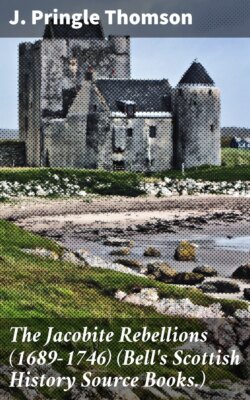Читать книгу The Jacobite Rebellions (1689-1746) (Bell's Scottish History Source Books.) - J. Pringle Thomson - Страница 23
На сайте Литреса книга снята с продажи.
THE UNION IMPENDING (1703).
ОглавлениеTable of Contents
Source.—Memoirs of the Life of Sir John Clerk of Penicuik, Baronet, Baron of the Exchequer: extracted by himself from his own Journals, 1676–1755, p. 46. (Edinburgh: Scottish Historical Society, 1892.)
A Convention of Estates followed the Revolution by King William in 1688, which was afterwards turned into a Parliament, and continued 'till the Death of that King in 1702. The same parliament continued to sit upon the accession of Queen Ann to the Crown, and was not dissolved till the year 1703, when the new Parliament was called. … I have thrown together some observations on this session of Parliament in another Manuscript book, so shall say little here. It was divided into 3 factions, who, as they had different views, drove different ways. The first was what was called the Court party; they were for supporting the Crown and the Credit of the High Commissioner, consequently they were for giving moderate subsidies for supporting the Government against the insults of the French, with whom we were, at that time, in war. They had the union of the two nations in view, because they not only considered it as the happiest thing that could be brought about for the Interest of Great Britain, but because it was expressly recommended to them by the Queen. The second faction was that of the Jacobites; they were to thwart and disturb the Administration at any rate. The third faction was what went under the name of the Squadrone Volante. These consisted of about fifteen Lords and Gentlemen, all Whigs in their principles, but who herded together, and kept little or no communication with the Duke of Queensberry[13] and his Friends. They were for opposing everything which they durst oppose, but to keep firmly in their view the succession of the Crown in the House of Hanover. They pretended to be great Patriots, and to stand up chiefly in defence of the rights and privileges of the subjects; in a word, the public good and the liberty of the subjects were still in their mouths, but in their Hearts they were known to have Court preferments and places in the chiefest degree of veneration. These were the springs and motives of all their Actions, which appeared in a hundred instances thereafter. However, by the bye, I must say that such a Squadrone Volante in any Parliament seems to be always a happy means in the hand of Providence to keep the several members of an Administration in their duty, for people in great power seldom fail to take more upon them than falls to their share.
The chiefs of the Squadrone Lords were the Dukes of Montrose and Roxburgh, the Earls of Rothes and Haddington, all these young men of about 24 years of Age; but the chief of all, at least the man under whose name they principally voted, was the Marquis of Tweeddale, a very good Man, but not perfectly qualified for Court intrigues.
Amongst their Gentlemen was one Mr. Fletcher of Saltoun, a Man of Republican principles, who had spent his youth in Holland, had been forfeited under the late King James, but afterwards restored under King William by Act of Parliament. He was a man a little untoward in his temper, and much inclined to Eloquence. He made many speeches in Parliament, which are all printed, but was not very dexterous in making extemporary replies. He was, however, a very Honest Man, and meant well in everything he said and did, except in cases where his humour, passion, or prejudices were suffered to get the better of his reason.
